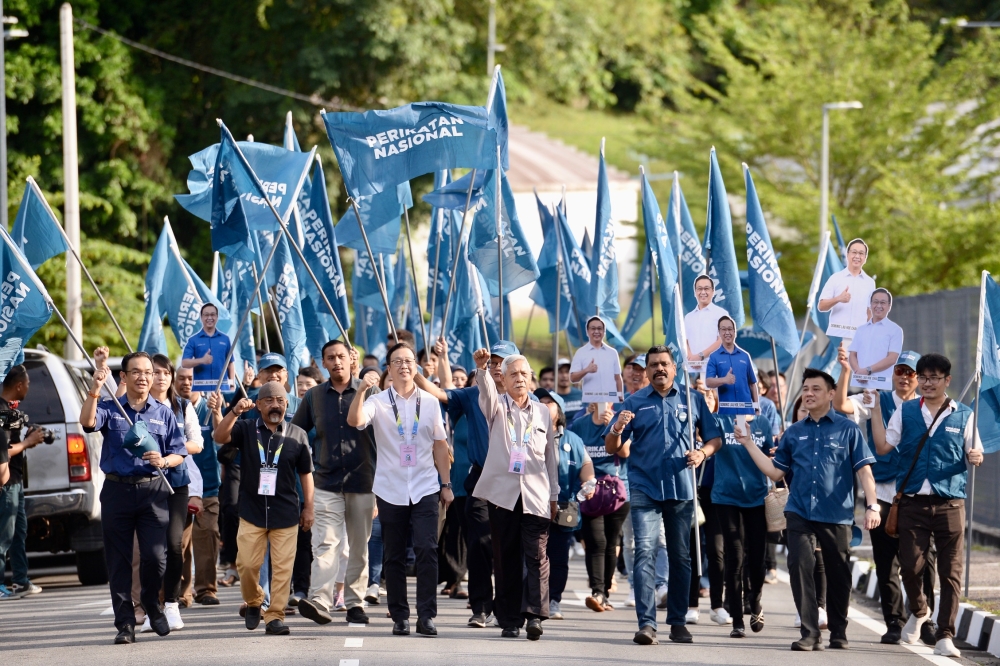GEORGE TOWN, Aug 10 — Pakatan Harapan-Barisan Nasional unity coalition could secure a two-thirds majority win in Penang on Saturday, according to analysts.
The experts feel the internal party squabbles in DAP over the dropping of incumbents for new candidates are only as minor issues that will not leave a large impact on support for the PH component.
However, for the unity front to win a two-thirds majority, they will have to retain the three seats in Permatang Pauh, namely Seberang Jaya, Permatang Pasir and Penanti.
Universiti Malaya sociopolitical analyst Associate Professor Awang Azman Awang Pawi said sentiment among voters is still strong towards PH, which will benefit the unity front.
“They will be able to retain Penang with a two-thirds majority if they pay more attention to the Permatang Pauh seats,” he said.
He said if they were to take winning those seats for granted, they might lose it to their political opponent.
Universiti Utara Malaysia (UUM) Associate Professor Mohd Azizuddin Mohd Sani concurred that the unity government will be able to retain Penang with a supermajority.
Both of them also said it is unlikely that PN will be able to win more than 10 seats in Penang as the sentiments in the northern state are strongly supportive of the unity government.
“It would be extraordinary if PN can win three to four seats in Penang,” Assoc Prof Awang said.
As for the infighting in DAP over the candidacy issue and allegations of a “tyrant”, they said this is only a minor issue that will not affect support for the PH component.
Mohd Azizuddin said the infighting in DAP will only minimally affect the party as voters mostly vote according to party lines.
“They will vote for DAP, no matter who is the candidate,” he said.
Senior Fellow of Singapore Institute of International Affairs Oh Ei Sun agreed that it may have a slight negative impact but DAP will continue to retain most if not all of its seats with a slightly reduced majority.
However, the situation is different when it comes to the tussle over the Bayan Lepas seat between PN components, Gerakan and PAS.

The nomination of Gerakan president Datuk Dominic Lau Hoe Chai in the Malay majority seat in the southern part of the island makes it harder for PN to win the seat from PH.
“It will be quite hard for PN to win Bayan Lepas but they have a higher possibility of losing when they put Lau there,” Awang said.
He said Lau should have been placed in a constituency with mixed ethnicity or with more ethnic Chinese.
He said it may be a strategy by PN leadership for Lau to win the seat for the coalition but PAS supporters and grassroots may not understand this.
“PAS voters may boycott by not voting or they might even vote the other side,” he said.
Mohd Azizuddin also said PAS’ unhappiness over Lau’s candidacy will give the incumbent Bayan Lepas assemblyman Azrul Mahathir Aziz a better chance in retaining his seat.
On the other hand, Oh said it is likely that PN could sweep up most of the 15 Malay-majority seats in Penang.
“Dominic is likely to still at least squeeze by, as the Malay voters identify with the religious appeal of PAS in general and thus PN by extension,” he said.
He also said it was unlikely that the unity front could win a two-thirds majority due to the political inroads made by PN.
He does not discount the possibility of PN winning over the state with a simple majority if they managed to win all of the Malay-majority and mixed ethnicity seats.
Awang and Mohd Azizuddin disagreed, and said sentiments on the ground now are still pro-PH and the unity government.
They said there will not be a repeat of 2008 when there was a sudden switch in support, leading to a change in state government.
Awang said Penang voters are mostly concerned with the economy and they would not vote for a party with poor performance in terms of economic development such as in Kedah, Kelantan and Terengganu.
“There is no reason for them to ‘mengKelantankan’ (Kelantanise) Penang, the rational voter wants the economy to continue to improve so they will choose the PH-BN unity front to lead Penang,” he said.
He said PH has already shown a good performance in governing Penang so the voters would want continuity.
There are a total of 40 state seats in Penang with 15 Malay majority seats mostly on the mainland and a few on the island.
In order to win a two-thirds majority, a coalition will have to win more than 26 seats while any coalition that wins 21 seats will have gained a simple majority to rule the state.






















